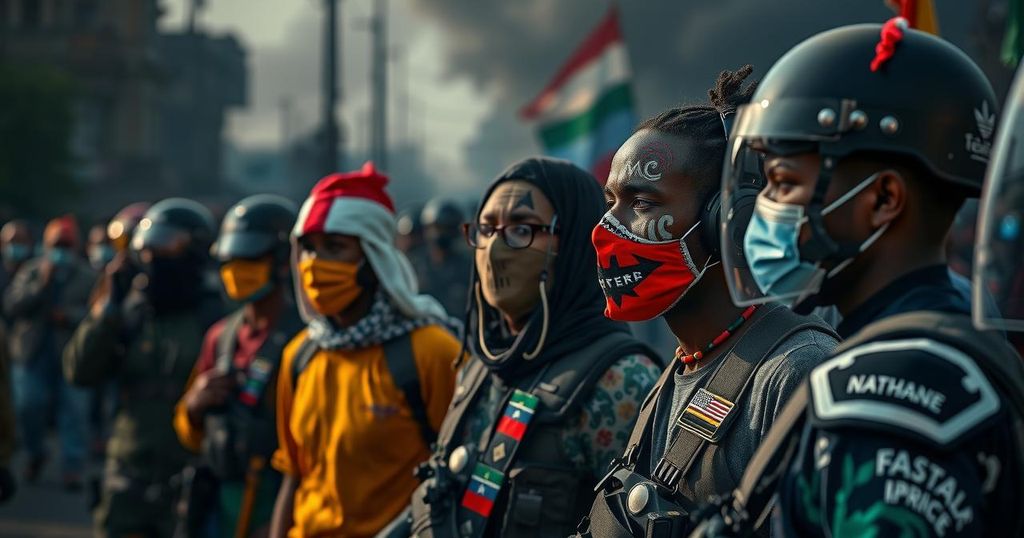Protests in West Africa are often met with excessive violence from law enforcement, demonstrating a troubling trend of repression that endangers the lives of young demonstrators. Reports highlight numerous fatalities due to the use of live ammunition and indiscriminate force, reflecting not a state’s power but its weakness. A shrinking civic space and the lack of accountability for police actions exacerbate this crisis, demanding urgent reforms to safeguard human rights and restore public trust in governance.
Protests across West Africa are increasingly met with severe repression, often resulting in fatalities and injuries among demonstrators. Numerous reports from Amnesty International highlight the use of excessive force by security forces, demonstrating not the state’s strength but its inherent weakness. Young protestors are routinely subjected to live ammunition, tear gas, and aggressive assaults, undermining the credibility of governments in the eyes of both domestic and international observers.
In Senegal, over 65 individuals lost their lives during anti-government protests from March 2021 to March 2024, coinciding with political tensions surrounding the presidential election. Similarly, Guinea’s protests have claimed at least 113 young lives since 2019 against the regime resistant to democratic transition. Sierra Leone reported 27 deaths during demonstrations concerning living costs in August 2022, while Mali witnessed the tragic loss of 18 lives amidst widespread dissent over governance issues in 2020. These incidents reflect a disturbing trend across the region, where dissent is met with lethal force.
The broader context reveals a shrinking civic space characterized by intensified repression. Speech, assembly, and expression freedoms have been systematically attacked, with authorities often stifling opposition protests under dubious pretexts. In countries like Mali and Burkina Faso, political activities have been curtailed, and in Guinea, a government announcement in 2022 prohibited all protests. Activists face arbitrary arrests, while media outlets encounter restrictions on their operations.
The pervasive climate of repression not only degrades the rule of law but also fosters an environment where law enforcement feels emboldened to inflict violence without consequence. Most investigations into these violent encounters go unresolved, leading to a culture of impunity within law enforcement ranks. For instance, Senegal’s 2024 amnesty law obliterated legal recourse for victims of police violence since 2021, further entrenching this lack of accountability.
Moreover, authorities routinely invoke the legality of their actions, claiming protests are illegal or violent. However, international human rights guidelines mandate that legal force must only be used minimally and under strict conditions. The indiscriminate violent responses of security forces toward demonstrators, many of whom are young individuals seeking basic rights, creates lasting physical and emotional scars, hindering their ability to thrive and leading to tragic outcomes for many.
This violence demonstrates not the strength but rather the frailty of these states, eroding public trust and intensifying societal insecurity. A robust state is defined by its ability to maintain order through adherence to lawful practices, ensuring accountability for any abuses of power. For West African authorities, acknowledging and addressing these human rights violations is crucial. Failure to do so will continue to damage their legitimacy domestically and internationally, necessitating a reevaluation of their approaches to governance and citizen engagement.
In West Africa, protests have become increasingly dangerous as governments respond with brutal force against dissent. This violence is emblematic of a broader trend towards authoritarianism as civic spaces shrink and human rights abuses flourish. The inability of authorities to engage constructively with their populations has led to tragic outcomes, particularly for the youth seeking to express legitimate grievances. Various countries in the region face a pressing need for reforms to curb police violence and restore public trust.
In conclusion, the landscape of protests in West Africa is deeply marred by the brutal response of law enforcement agencies, resulting in significant loss of life and injury among protesters. This violence exposes the fragility of governmental authority and raises critical questions about the legitimacy of these regimes. A concerted effort by authorities to uphold human rights and engage with their citizens in a transparent manner is essential to foster peace and stability. Only when governments prioritize respect for human rights can trust be rebuilt and meaningful progress achieved in these nations.
Original Source: www.amnesty.org






